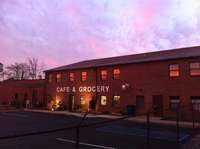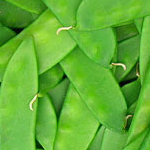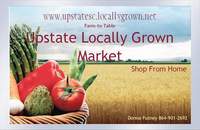The Weblog

This page contains news, event information, and other items added by the market managers. This is where you will find old newsletters, plus info not included in your weekly newsletter, plus the past year’s weekly newsletters. 10 pages at a time are visible. You may choose to go back further at the bottom of this page.
Thank you for your interest.
“Thanks to all who make this possible!!” ~
DM, Greenville SC
“I’m really happy with everything I received. How juicy and tasty
I’m so thankful for reliable growers and market.” ~ MC, Greenville SC
visit us on Facebook.
Upstate Locally Grown on Facebook
.
“Needing info on a plant? “Click here for Dave’s Garden Plant Search site”: PlantFiles search code:
Harvest News: Thursday, Jan. 25-Monday, Jan. 29
This post expired on January 25, 2015.

Upstate Locally Grown Market
www.upstatesc.locallygrown.net
To Contact Us
CLICK HERE TO UNSUBSCRIBE OR CHANGE YOUR ACCOUNT STATUS
TO CONTACT US
Market Director
Donna Putney
EDITOR
Heidi Williams
GREENWOOOD Market Manager:
Courtney Rebovich
Packing Coordinator: Shae Smith
DROP_OFF SCHEDULE
Recipes

Crock Pot Falafel
Gluten Free!
- 8 ounces dried chick peas (garbanzo beans), or half a bag.
- 1/2 onion, chopped
-1 T dried parsley
- 2 cloves minced garlic
- 1 Putney Farm egg*
- 1 t kosher salt
- 1/4 t black pepper
- 2 t ground cumin
- 1 t ground coriander
- 1/4 t cayenne pepper
- juice from 1 lemon
- 1/2 to 3/4 cup bread crumbs (Panko or homemade)
- 2 T olive oil (for the bottom of your crockpot)
- Split Creek yogurt*
Method:
Quick soak beans by boiling for a minute and then allowing to sit for 1 hour or soak overnight.
Drain and rinse beans. And cook until tender and skins slid off easily, about 1.5 hours.
(Or, this recipe works with a 15-ounce can of rinsed and drained chickpeas).
Dump chickpeas them into a mixing bowl and smash with a fork. Set aside.
Using a blender, food processor or hand mixer, blend together all of the spices, the onion, the garlic, the egg, and the lemon juice.
Pour on top of your smashed garbanzo beans. Use your fork to mix together, and add the breadcrumbs slowly until the mixture is wet and sticky but can be formed into balls nicely.
Pour 2 T of olive oil into the bottom of your crockpot.
Form golf-ball sized patties of falafel and then carefully squish flat (but not too flat or they will crumble!). Dip each side into the olive oil and then nestle into your crockpot. It’s okay if they overlap or are on top of each other.
Cook on high for 2-5 hours. You will know that the falafels are done when they turn brownish-golden. You can flip them halfway through the cooking time but this is not necessary.
Serve with Split Creek lemon yogurt, sprinkled with dill and celery seed, or Greek yogurt mixed with celery seed, dill, salt and pepper and lemon juice.
Serve on corn tortillas with lettuce, tomato, and the yogurt sauce. This is enough food for a family of four.
- These products can currently be found fresh on the Market page at USLG
Market News
Featured and Fresh Products to Look for this Week:
Greens
Fresh Herbs
Baked Goods galore
Beef
Pork chops
Pork sausage
Scallions
Carolina Sweet Onions
Spinach, lettuce, and beet greens
Rutabaga
… plus all your favorite Putney Farm eggs, Happy Cow milk products, and much, much more!
IMPORTANT USLG UPDATES
In Transition: Remember to continue to draw down your balances to zero, and pay-as-you-go for a time. USLG is on the move, with many good changes ahead of us.

NEW DROP-OFF LOCATION! SWAMP RABBIT CAFE AND GROCERY, Cedar Lane, Greenville, will be our newest drop-off location for USLG’ers near Traveler’s rest or Downtown Greenville: located along the Swamp Rabbit Bike trail!
New Year, New Opportunities for Potential MARKET HELPERS!
It takes a villiage to make a food system work, you know! We have need for:
- Extra hands at drop off
- Tuesday order packers
- Writers to contribute to Harvest News
- Facebook/Twitter page administrators
- Web helpers (to work on the back end of the site managing weekly orders)
Whether you have an hour a month, a couple of hours a week, or a few extra minutes at drop-off, there are so many ways that we could use your unique talents to benefit local farms, artisans, and families. To see if you might fit into a slot, please email (click here:) Donna at putneyfarm@aol.com
Reduce, Reuse, and Recycle Your Egg Cartons With USLG!
Reduce greenhouse gases and save a trip to the recycling can by throwing your CLEAN Putney Farm cardboard or PET egg cartons back in your reusable grocery bag when they have been emptied out, and bring them to drop-off next time. We can reuse these for your future egg purchases. Thanks!
Prayer Request
Please keep Donna and her wonderful husband, Lenard, in your prayers as they struggle through some health issues. We need your support and helping hands to carry us through this rough spot.
Have a wonderful week, happy shopping on USLG, and good family meals from all your goodies! Donna and Lenard, and the whole gang of Market helpers.
Why I Eat Local
Guest Blogger: Lloyd E. Willis, PhD
Dr. Willis, who is a supporter of our Greenwood Locally Grown branch and an English professor at Lander University, has authored two books, one on environmental issues. USLG is thrilled to be able to start featuring his writing in the Harvest News!
Where does environmentalism stand today?
For a number of years I studied the history of environmentalism as an academic subject, and the longer I pursued that goal I found it more difficult to understand the environmentalism of the current moment. Today, it is still hard to determine where things stand. It’s now possible to find organic products in Walmart and most any chain grocery store; some studies show that the United States consumes less gasoline now than it did in 2008; and we all now use cfl lightbulbs, like ’em or not.
But I can never determine if I should see these things as progress or greenwashing that makes us feel just environmentally friendly enough to justify deferring wholesale changes in our daily lives.
The same situation exists on the pollution front: It’s been a while since a river caught on fire in the United States, and it’s now been 23 years since the Exxon Valdez coated Prince William Sound in crude oil, but in the past two years the Deepwater Horizon dwarfed the Exxon Valdez disaster in the Gulf of Mexico and we all bore witness to the world’s greatest peacetime nuclear disaster in Fukushima, Japan. What environmental catastrophes have lost in frequency they have gained back in scale.
I have gone swimming in the Gulf of Mexico, and I have seen many a Florida sunset sink beneath its waters; when the Deepwater Horizon was pumping hundreds of thousands of crude oil into it and Louisiana’s estuaries, I could feel the damage in my soul, but Prince William Sound and Fukushima, Japan are complete abstractions. I understand them as I might understand a Chemistry textbook, but I don’t feel the loss of those environmental travesties.
I applaud those who can think and act globally (thank you, Al Gore) but to truly believe the world can change I have to narrow my focus—like to the food I put in my mouth. For my money, food is the most powerful factor in environmentalism today. The plate and the fork are the unavoidable instruments that maintain our now largely invisible link to the nonhuman world of soil, sun, and water, and the plate and fork bind us all together. Despite differing religions, political points of view, and economic statuses, we all eat. This may be the last thing we all have in common. And today what we put on our plates can be genetically engineered, synthetic, raised by exploited laborers, fertilized with chemicals, sprayed with poisons, and shipped from Argentina or New Zealand. Or it can be organic and local; produced by expert farmers and artisans; and completely wholesome. Each of us gets to decide what we eat, and the decisions we make reverberate into all the larger issues: food miles, national farm policies, fundamental issues about land use, the value and danger of GMO’s, the basic relationship we want to forge with the world around us.
As basic as they are, eating and participating in an economy are always political actions. I thank God that Upstate Locally Grown gives me the opportunity to both eat and buy in ways that allow me to remain true to the values of responsibility and sustainability that I privilege above almost anything else.
We thank you for your interest and support of our efforts to bring you the healthiest, the freshest and the most delicious locally produced foods possible!



